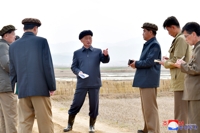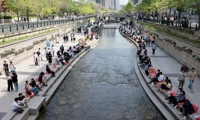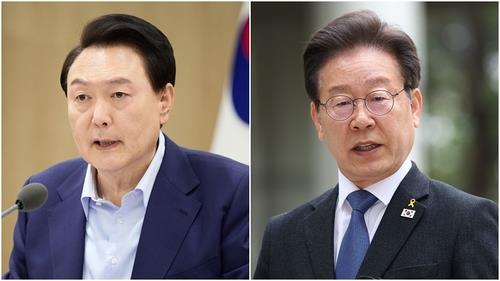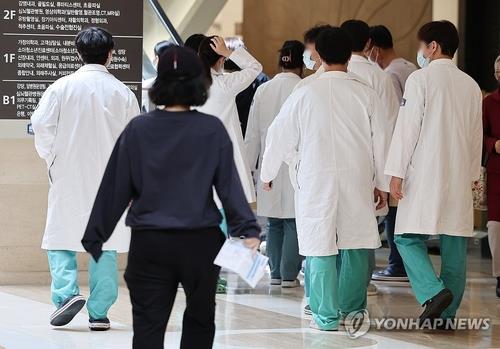(3rd LD) New virus cases on downtrend, but imported infections accelerate
(ATTN: ADDS official's remarks, details in para 2, paras 14-17; UPDATES with minor edits throughout)
SEOUL, March 24 (Yonhap) -- South Korea's new virus cases appeared to be steadily decreasing Tuesday, but imported infections saw their biggest one-day increase as the nation enforced quarantines on arrivals from Europe and other regions.
The 76 new cases, which were detected Monday and were slightly up from the 64 new cases a day earlier, brought the nation's total infections to 9,037, according to the Korea Centers for Disease Control and Prevention (KCDC). The death toll rose by 13 to 124 and 62 patients are in critical condition.
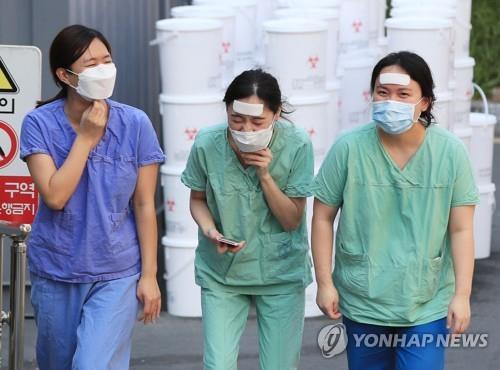
Medical staffers walk to a staff lounge after finishing a shift at Dongsan Hospital in coronavirus-hit Daegu, 302 kilometers southeast of Seoul, on March 24, 2020. (Yonhap)
Monday's new cases marked the 13th consecutive day that the daily figure for new infections stood less than 100.
The mortality rate stood at 1.33 percent as of Monday, according to the KCDC. For those aged 80 and above, the fatality rate was 12.97 percent.
Of the 76 new cases, 31 are in Daegu and one is in North Gyeongsang, the two worst-affected regions, the KCDC said.
Seoul, Incheon and Gyeonggi Province, which surrounds Seoul and Incheon, saw their new daily infections rise by 20 to 741 on Monday.
The total number of imported virus cases rose by 20 to 67, causing concern as it is the biggest one-day rise so far.
South Korea began implementing stricter rules on social distancing Sunday to slow the coronavirus pandemic that emerged in China late last year.
Citizens are strongly urged to stay at home, except for essential needs or jobs, with the government also restricting religious gatherings, indoor sports activities and attendance at entertainment facilities, such as night clubs.
South Korea has enforced a two-week quarantine period and virus tests for all long-term arrivals from Europe, regardless of symptoms, in an effort to contain imported virus cases.
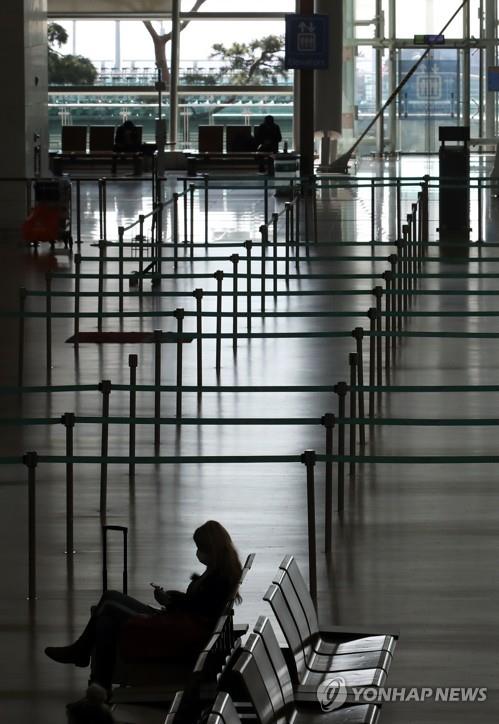
A check-in counter is almost deserted at the departure lobby of Incheon airport, west of Seoul, on March 24, 2020, one day after South Korea issued a "special travel advisory" calling on its citizens to cancel or postpone their trips abroad over the spread of the new coronavirus. (Yonhap)
A total of 1,203 people came to South Korea from Europe on Monday, about 90 percent of whom were Korean nationals. Of them, 101 people showed symptoms, said Yoon Tae-ho, a senior health ministry official in charge of containment measures.
All people coming from Europe will get tested for free, but the Korean government will not pay living costs for them during the 14-day quarantine period, Yoon said.
The rule will be applied to people coming from other nations if authorities expand quarantines on arrivals from such places, Yoon said.
In addition to the 20 confirmed cases of imported infections on Monday, two more imported cases were confirmed by local governments, KCDC Deputy Director Kwon Jun-wook said.
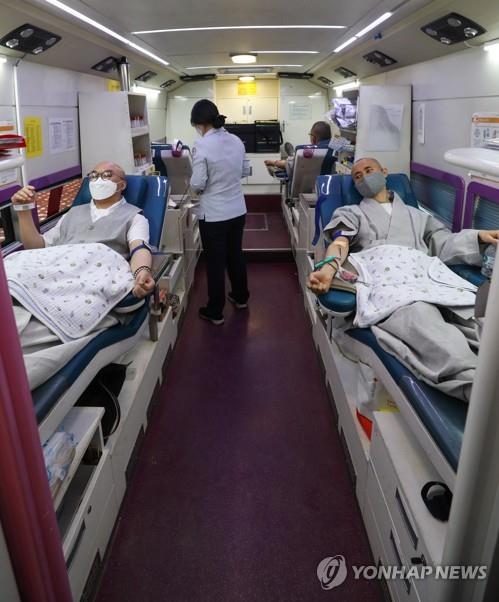
Buddhist monks donate blood inside a bus of the Korea Red Cross at Jogye Temple in Seoul on March 24, 2020, amid a shortage of blood due to the spread of the new coronavirus. (Yonhap)
To effectively handle the rapid increase in imported virus cases, the authorities have decided to require South Korean nationals coming from Europe and showing no symptoms to self-quarantine at home first from Tuesday 2:00 p.m., Kwon said.
They will be tested by local health officials within three days.
Foreigners coming from Europe for long-term stays will be quarantined at an isolation facility first and be tested there, Kwon said.
Previously, all people coming from Europe were tested first and sent home for self-isolation or to facilities.
So far, 3,507 patients have recovered from COVID-19, and 5,410 have been treated for it. South Korea has tested 348,582 people since Jan. 20, when the virus was first detected on South Korean soil.
kdh@yna.co.kr
(END)
-
 Overdue debut of Korean abstract art pioneer Yoo Young-kuk at Venice Biennale
Overdue debut of Korean abstract art pioneer Yoo Young-kuk at Venice Biennale -
 Defense chief says N. Korea's hypersonic missile 'unsuccessful' in last-stage glide flight
Defense chief says N. Korea's hypersonic missile 'unsuccessful' in last-stage glide flight -
 Relax, immerse yourself in scents at Venice Biennale's Korean Pavilion
Relax, immerse yourself in scents at Venice Biennale's Korean Pavilion -
 N. Korea has capability to genetically engineer biological military products: U.S. report
N. Korea has capability to genetically engineer biological military products: U.S. report -
 S. Korea marks 30th anniv. of Korean Pavilion at Venice Biennale with contemporary art
S. Korea marks 30th anniv. of Korean Pavilion at Venice Biennale with contemporary art
-
 Overdue debut of Korean abstract art pioneer Yoo Young-kuk at Venice Biennale
Overdue debut of Korean abstract art pioneer Yoo Young-kuk at Venice Biennale -
 Relax, immerse yourself in scents at Venice Biennale's Korean Pavilion
Relax, immerse yourself in scents at Venice Biennale's Korean Pavilion -
 S. Korea marks 30th anniv. of Korean Pavilion at Venice Biennale with contemporary art
S. Korea marks 30th anniv. of Korean Pavilion at Venice Biennale with contemporary art -
 Defense chief says N. Korea's hypersonic missile 'unsuccessful' in last-stage glide flight
Defense chief says N. Korea's hypersonic missile 'unsuccessful' in last-stage glide flight -
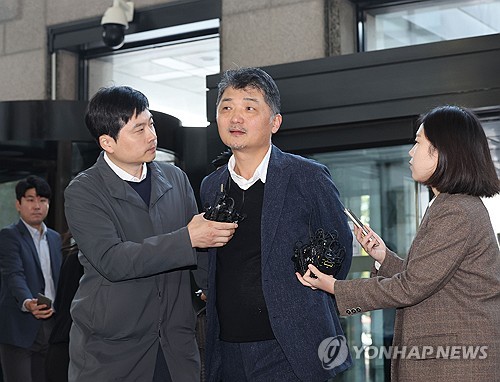 Questioning necessary for Kakao founder for suspected stock rigging: prosecution
Questioning necessary for Kakao founder for suspected stock rigging: prosecution
-
 Gov't likely to accept university chiefs' request to lower med school enrollment quota
Gov't likely to accept university chiefs' request to lower med school enrollment quota -
 Facebook page unveils photos of BTS member V in counter-terrorism unit gear
Facebook page unveils photos of BTS member V in counter-terrorism unit gear -
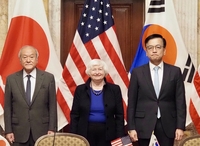 (4th LD) Finance chiefs of S. Korea, U.S., Japan recognize 'serious' concerns over 'sharp' won, yen depreciation
(4th LD) Finance chiefs of S. Korea, U.S., Japan recognize 'serious' concerns over 'sharp' won, yen depreciation -
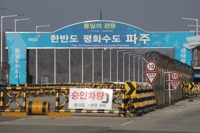 (2nd LD) N. Korea removes street lamps along inter-Korean roads
(2nd LD) N. Korea removes street lamps along inter-Korean roads -
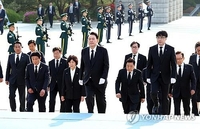 Yoon's approval rating sinks to lowest point since taking office
Yoon's approval rating sinks to lowest point since taking office















